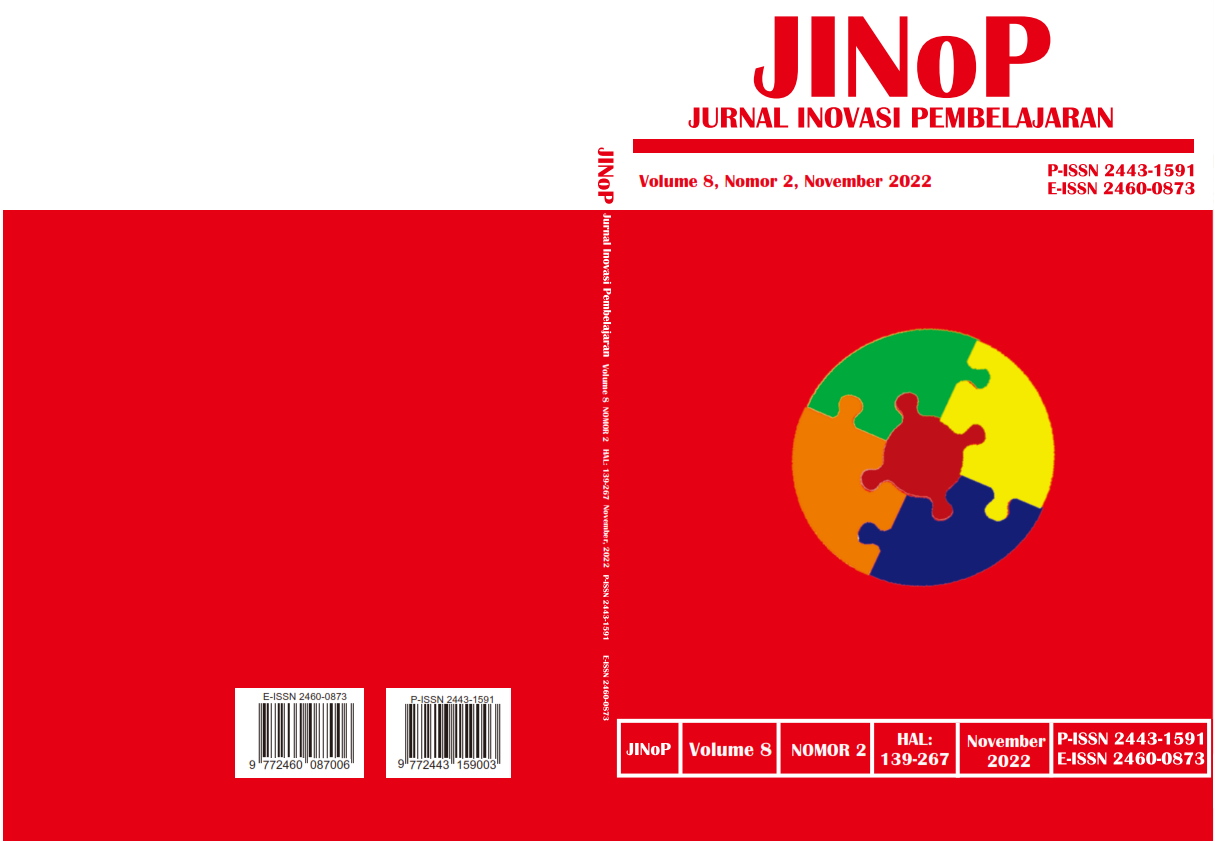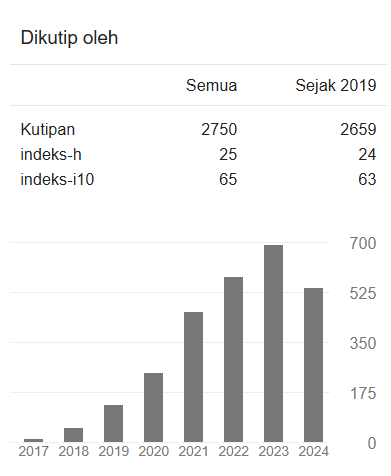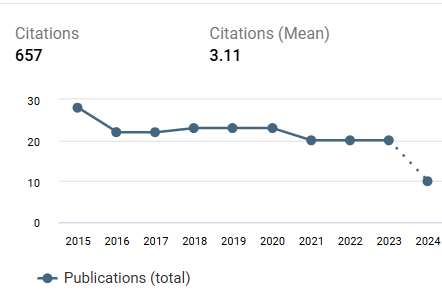Pengembangan EduKependudukan digital di sekolah siaga kependudukan untuk mewujudkan sustainable development goals (SDGs)
DOI:
https://doi.org/10.22219/jinop.v8i2.22296Keywords:
EduKependudukan Digital, SDGs, R&DAbstract
The research background dealt with the increased of estimated population of Indonesia which is currently anticipated by the Sustainable Development Goals (SDG). One of the actions to anticipate the population growth is through population education in schools, targeting youth who are candidates for the next generation and at the same time a component of development. The purpose of this research is to develop Edukependudukan digital or digital population education in realizing quality education in schools as an effort to achieve the Sustainable Development Goals (SDGs). Considering that the target of population education is the younger generation who need to follow the development of their age characteristics, it is necessary to have a technology-based model of population education. The stages of the method in this study used seven Research and Development steps from Borg and Gall. The results of the study show that the EduKependudukan digital scheme that has been developed into an implemented digital application in schools was showing valid, feasible and useful result for students. The results of the response test showed that the students' response to the application content was 83.13% in the good category and the student's response to the application design was 86.83 in the very good category. The results of the study showed that there was an increase in students' knowledge after using EduKependudukan digital as seen from the average score during the pre-test, which increased from 45.39 to 71.65 during the post-test. EduKependudukan digital can be used as a media for socializing population for high school students as an effort to realize quality education as Sustainable Development Goal 4 (SDG).
Downloads
References
BPS [Badan Pusat Statistik]. (2021). Berita resmi statistik. Bps.Go.Id, 27, 1–52.
Abdiyah, A., Hartanti, F. I., & Sulistyorini, Y. (2020). Implementation Analysis of Sekolah Siaga Kependudukan (SSK) in East Java 2019. 9(December), 137–145.
Amaruddin, H., Atmaja, H. T., & Khafid, M. (2020). Peran Keluarga Dan Media Sosial Dalam Pembentukan Karakter Santun Siswa Di Sekolah Dasar. Jurnal Pendidikan Karakter, 10(1), 33–48.
Awwaluddin, A. M., & Sadewo, F. S. (2021). Analisa Kebijakan Pendidikan Kependudukan: Sekolah Siaga Kependudukan (Ssk) Dalam Perspektif Teori Agil Talcott Parssons. Jurnal Ilmiah Muqoddimah: Jurnal Ilmu Sosial, Politik Dan Hummanioramaniora, 5(1), 181.
Baron, A., Bedore, L. M., Peña, E. D., Lovgren-Uribe, S. D., López, A. A., & Villagran, E. (2018). Research article. American Journal of Speech-Language Pathology, 27(3), 975–987.
BKKBN. (2015). Modul Pembekalan Guru SMA Dalam Pengintegrasian Pendidikan Kependudukan Tahun 2015.
BKKBN. (2017). Infografis Pendidikan Kependudukan.
Boeren, E. (2019). Understanding Sustainable Development Goal (SDG) 4 on “quality education” from micro, meso and macro perspectives. International Review of Education, 65(2), 277–294.
Deffinika, I., Putra, A. K., Insani, N., Islam, M. N., Attamimi, R., Bagus, A., & Mukti, K. (2020). Health Dalam Mendukung Sekolah Siaga Kependudukan di Kabupaten Malang. 3(2), 54–60.
Komatsu, H., & Rappleye, J. (2018). Will SDG4 achieve environmental sustainability? Center for Advanced Studies in Global .
Lingga, M., Aminuyati, & Okkiana. (2018). Implementasi Kurikulum 2013 Pada Pembelajaran IPS Kelas VII DI SMP LKIA Pontianak. Jurnal Pendidikan Dan Pembelajaran Khatulistiwa, Vol 7, No.
Mayasari, S., & Husin, A. (2017). Remaja Genre: Peluang Menuju Bonus Demografi. Demography Journal of Sriwijaya (DeJoS), 1(Vol 1 No 2 (2014): Vol 1, No 2 (2014)), 4–8.
Mukri, S. G. (2018). Menyongsong Bonus Demografi Indonesia. ’Adalah, 2(6), 51–52.
Nafisah, D., Liesnoor, D., Banowati, E., & Sugeng, A. (2020). Pendidikan Berbasis Ekopedagogik Dalam Pembelajaran IPS Di Era New Normal. 19(2019).
Nazar, R., Chaudhry, I. S., Ali, S., & Faheem, M. (2018). Role of Quality Education for Sustainable Development Goals (Sdgs). PEOPLE: International Journal of Social Sciences, 4(2), 486–501.
Ojo, F. T. (2013). Population Education for Better Quality Life. Journal of Educational and Social Research, 3(6), 153–159.
Pamungkas, M. A. (2017). Milenium Development Goals Dalam Rangka Menanggulangi Kemiskinan di Yogyakarta. 20150520132, 1–9.
Pandey, D. A. (2011). Impact of Population Education on Student Teachers. Indian Journal of Applied Research, 4(8), 125–126.
Rulandari, N. (2021). Study of Sustainable Development Goals (SDGS) Quality Education in Indonesia in the First Three Years. Budapest International Research and Critics Institute (BIRCI-Journal): Humanities and Social Sciences, 4(2), 2702–2708.
Safitri, N. F., Setyowati, D. L., & Khafid, M. (2019). Strengthening the Character Education based on the Social Skills of Students in the Integrated Thematic Learning in Primary Schools. Educational Management, 8(2), 240–247.
Sarmita, I. M., Astawa, I. B. M., & Citra, I. P. A. (2020). Pengintegrasian Pendidikan Kependudukan Berbasis SSK di SMP TP 45 Sukadasa Desa Wanagiri Buleleng. Proceeding Senadimas Undiksha 2020 |, 468–479.
Sitorus, A. (2017). Integrasi Pendidikan Kependudukan ke dalam Kurikulum dalam Rangka Pencapaian Target Sustainable Development Goals (SDGs) di Indonesia.
Sofiasyari, I., Atmaja, H., & Suhandini, P. (2019). Pentingnya pendidikan karakter pada siswa sekolah dasar di era 4.0. Prosiding Seminar Nasional Pascasarjana (PROSNAMPAS), 2(1), 734–743.
Wita, S., & Ummami, W. (2021). Peran Bahan Ajar Berbasis Karakter pada Pembelajaran Pendidikan Kependudukan dan Lingkungan Hidup di Tingkat Perguruan Tinggi. Jurnal Basicedu, 5(5), 3755–3764.
World Population Data. (2020). Demographic Trends May Make Us Vulnerable to Pandemics Data Table. 22.
Yulianti, D. (2017). Program Generasi Berencana (GenRe) Dalam Rangka Pembangunan Manusia Menuju Pembangunan Nasional Berkualitas. Jurnal Analisis Sosial Politik, 1(2), 93–108.
Downloads
Published
How to Cite
Issue
Section
License
Copyright (c) 2022 Septiani et al

This work is licensed under a Creative Commons Attribution 4.0 International License.
Copyright Notice
Authors who publish with JINoP (Jurnal Inoasi Pembelajaran) agree to the following terms:
- For all articles published in the JINoP (Jurnal Inovasi Pembelajaran), copyright is retained by the authors. Authors give permission to the publisher to announce the work with conditions. When the manuscript is accepted for publication, the authors agree to the automatic transfer of the publishing right to the publisher.
- Authors retain copyright and grant the journal the right of first publication with the work simultaneously licensed under a Creative Commons Attribution 4.0 International License. that allows others to share the work with an acknowledgment of the work's authorship and initial publication in this journal.
- Authors are able to enter into separate, additional contractual arrangements for the non-exclusive distribution of the journal's published version of the work (e.g., post it to an institutional repository or publish it in a book), with an acknowledgment of its initial publication in this journal.
- Authors are permitted and encouraged to post their work online (e.g., in institutional repositories or on their website) prior to and during the submission process, as it can lead to productive exchanges, as well as earlier and greater citation of published work (See The Effect of Open Access).








